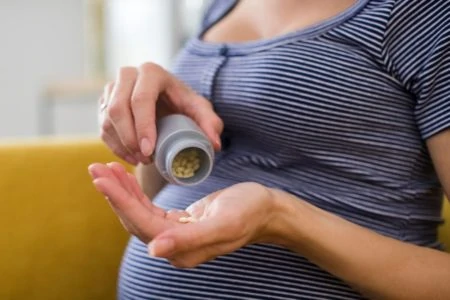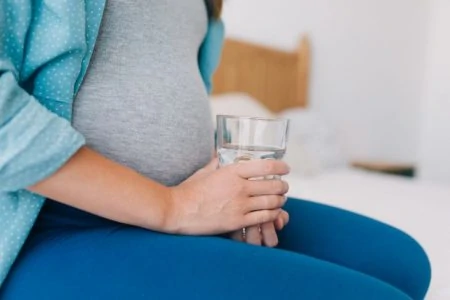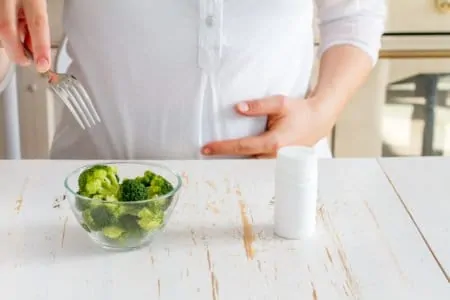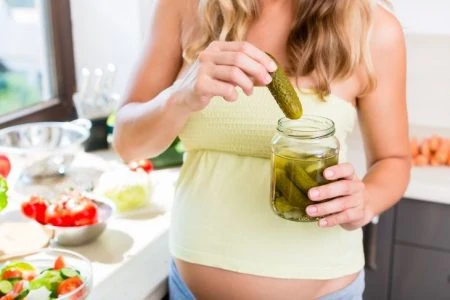Have you done the test, seen the doctor, and confirmed you’re pregnant? Congratulations!
However, if your doctor has recommended an iron supplement, you may find yourself overwhelmed quickly. There are so many options on the market; it gets confusing after a while.
We’ve taken the time to study all the top brands and have tried quite a few during our own pregnancies. We’ll take the guesswork out of the process and explain how to choose the best iron supplement for your pregnancy.
We rated these supplements based on the types and amounts of iron in each, which are better absorbed by the body with the fewest side effects, and — of course — which ones taste best. Whether you prefer tablets, capsules, liquids, or chewables, we’ve got you covered. We’ll also talk about why iron is important during pregnancy and which foods you can eat more of to increase your iron stores naturally.
- With beetroot to help lower blood pressure
- Proven effective in a clinical study
- Certified kosher & GMO-free
- From organic plants & fruits
- Can be added to juice or water
- No binders or fillers
The Importance of Iron During Pregnancy
Iron is a mineral our bodies need to stay healthy. Red blood cells contain most of the iron in our body in a pigment called hemoglobin. Hemoglobin is responsible for carrying oxygen to the cells, organs, and tissues where it’s needed.
When our iron levels get low, so does our hemoglobin. This is bad news, as it reduces the oxygen supply in our blood. Anemia is the name given to low hemoglobin levels.
The normal levels during the first and last trimester of pregnancy are considered to be above 11 grams per deciliter. This changes during the second trimester, when they can be slightly lower, at 10.5 grams per deciliter.
You might feel like a pin cushion during pregnancy, having samples taken all the time. It is necessary, though, to make sure all is well. One of the things checked during blood tests is your iron levels.
Doctors will also check how much iron your body has stored. Yes, it can retain a certain amount of iron for when it’s needed. If you have depleted your stores and your hemoglobin levels are low, you’ll need iron supplements (1).
In addition to supplying nutrients for two, you are also supplying blood for two when you’re pregnant, so your blood supply increases. You will need about double the amount of iron you normally do, about 27 milligrams per day.
If you’re deficient in iron, you can start to feel tired, weak, and dizzy. Your pregnancy glow can wane, and you will look pale and probably find yourself breathless. On top of all your other pregnancy symptoms, this is no walk in the park (2).
One surprising way to increase your iron stores naturally is to cook some of your food in an old-fashioned cast iron skillet, which will leach iron into your meals. You can also add iron-rich foods to your diet. However, these means may not be enough, and your doctor may recommend you add an iron supplement to your vitamin regime.
How to Choose an Iron Supplement
Narrowing down the ingredients that will benefit you can help you make an informed decision when choosing an iron supplement. Here are some of the things you should look for.
Take Note
Product Reviews
These five iron supplements are the best options we’ve found for increasing iron levels during pregnancy.
MegaFood Blood Builder
Best Overall
This multivitamin and iron supplement from Mega Food is gentle on the stomach and should not cause constipation. It contains 26 milligrams of iron and also has vitamin C to help iron absorption and vitamin B12 and folates for pregnancy health.
It’s available in four sizes, from 30 to 180 tablets. This is great because you can save money by buying in bulk.
Another great thing about these tablets is they are suitable for vegans and vegetarians. They are certified kosher and free from GMOs. They have no dairy or soy and are also gluten-free.
Pros
- It also contains beetroot to help lower blood pressure (4).
- Helps boost iron levels and prevent fatigue.
- Tablets are designed to be easy to swallow.
Cons
- Some find the tablets taste metallic.
Our Ratings
Pure Encapsulations Liquid Iron
Best Liquid
Flavored with blueberries, this liquid supplement from Pure Encapsulations is suitable for vegans and vegetarians and is an excellent option for expectant moms. The recommended daily dosage of 15 milliliters will supply 25 milligrams of iron.
What I like best about this iron supplement, besides its being in liquid form, is that it is hypoallergenic, non-GMO, gluten-free, and free from preservatives and artificial coloring. The addition of vitamins C, B12, and E enhances the formula, allowing you to absorb the iron easily and boost your hemoglobin production.
Pros
- Certified gluten-free.
- Hypoallergenic.
- Blueberry flavored.
- Many moms like the taste.
Cons
- Contains less iron than other brands.
- Expensive formula only lasts about 3 weeks.
Our Ratings
Garden of Life Iron Complex
Best Capsule
This product is certified vegan, non-GMO, gluten-free, and made from natural plant products. It is delivered in a single capsule, measuring less than 1 inch. However, if you find these too hard to swallow, you can break the capsules open and add the contents to a glass of juice or water.
As well as having 22 milligrams of plant-based iron, it also contains vitamin B12, vitamin C, and folates. It is easily digested and does not upset your stomach.
I particularly like that it also contains probiotics and enzymes, which can help support digestive health. They help the good bacteria in your stomach and help prevent diarrhea or constipation (5).
Pros
- Made from organic natural plants and fruits.
- You can open the capsules and add to juice or water.
- Does not contain any binders or fillers.
Cons
- Only 30 capsules in the bottle.
- Only 22 milligrams of iron.
Our Ratings
Floravital Liquid Iron Supplement
Best Vegan Supplement
Want an iron supplement that’s free from weird unnamed chemicals? Or do you have kosher dietary needs? Then Floravital is your supplement.
This brand offers a formula that is free from preservatives, artificial coloring, gluten, GMO, lactose, yeast, and more. Yet, it has been licensed by the FDA as providing the recommended daily allowance of iron for all women of childbearing age.
This was my go-to supplement during pregnancy and at other times when I needed an iron boost. Whether you’re pregnant, lactating, expecting, or menstruating, Floravital is a good option for you.
Because it uses ferrous gluconate and fruit and herbal extracts, this supplement tastes good and won’t stop up your bowels. What’s more, it also contains vitamins C and B.
Pros
- It tastes like fruit.
- No constipation.
- Safe for all women of childbearing age.
Cons
- Needs to be refrigerated.
- Expires within four weeks of opening.
Our Ratings
Natures Plus Chewable Iron Supplement
Best Chewable Tablets
These chewable tablets will deliver a dose of 27 milligrams of iron per tablet. They are suitable for vegetarians and are gluten-free. The natural ingredients make these gentle on the stomach, and we love the cherry flavor.
Added vitamin C will help your body absorb the iron it needs from this product.
These are made in the U.S. and are free from artificial preservatives and colorings. You only need to take one a day, so with 90 tablets in the bottle, they should last three months.
Pros
- Many love the cherry flavor.
- Gentle on the stomach.
- Natural ingredients.
Cons
- Does not contain any added vitamins or folates.
Our Ratings
Foods That Increase Iron Levels
Many foods contain iron, and eating them can boost your levels. This is by far the best way to get that essential mineral into your body.
Some forms of iron come from animals, and others are found in plants. While both contain iron, it’s not the same type.
Animal sources contain heme iron that is absorbed easier than the non-heme iron found in plants. These are some iron-rich foods you can add to your diet to help increase your iron levels (6):
Animal Sources
- Meat: beef, turkey, lamb, chicken, pork, veal, and liver.
- Seafood: mackerel, haddock, sardines, and shrimp.
- Shellfish: clams, scallops, and oysters.
- Eggs
Avoid raw or unpasteurized eggs, and limit fish that contain mercury.
Plant Sources
- Vegetables: spinach, kale, collard greens, broccoli, string beans, peas, and tomato products.
- Fruits: dates, strawberries, figs, prunes, other dried fruits, and watermelon.
- Bread: whole wheat, rye, and enriched white.
- Cereals: bran and oats.
- Beans and lentils: kidney, white beans, lentils, and dried peas.
- Syrups: corn syrup, maple syrup, and molasses.
- Other proteins: tofu and peanut butter.
Our bodies absorb iron better when it’s accompanied by vitamin C. So help yourself to a nice chilled glass of orange juice with your iron-rich foods. If you’re having cereal, chop up some fresh strawberries in it (7).
Tea, coffee, and other caffeinated drinks are not your friends when it comes to iron absorption. Caffeine reduces the uptake of iron from your food or supplements. If you must have your daily caffeine fix, make sure you consume it a few hours after taking an iron supplement or eating an iron-rich meal (8).
Another thing that can interfere with iron absorption is calcium. Make sure you don’t take a calcium supplement at the same time as an iron supplement. And avoid milk and other dairy products for an hour before and two hours after taking iron (9).
Side Effects of Iron Supplements
Some common side effects of iron supplements include constipation, nausea, vomiting, and diarrhea. I know, you already have enough to contend with when you’re pregnant without adding more to the mix.
If your supplement makes you feel sick, try not to take it on an empty stomach. If it still causes you trouble, try a different type. You can also keep constipation at bay by increasing your fluid and fiber intake.
If any side effects are bothersome, speak to your health care provider for advice and support (10).




















